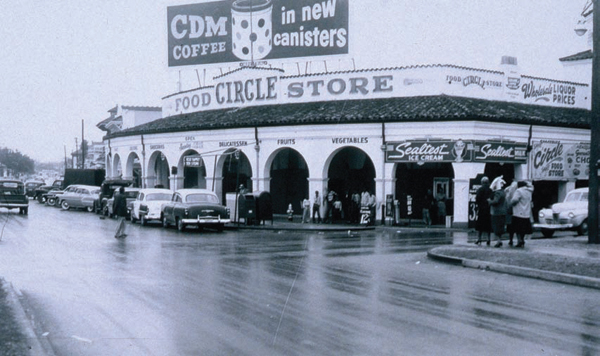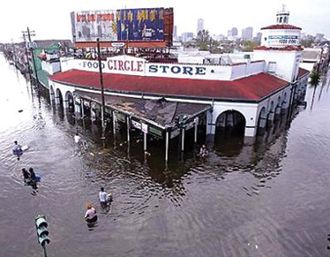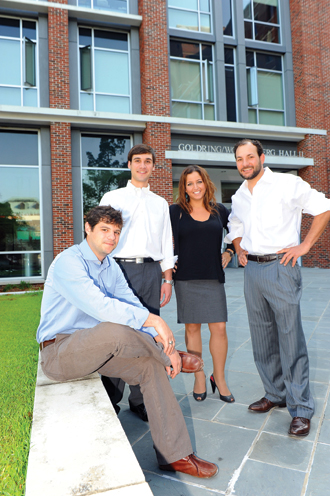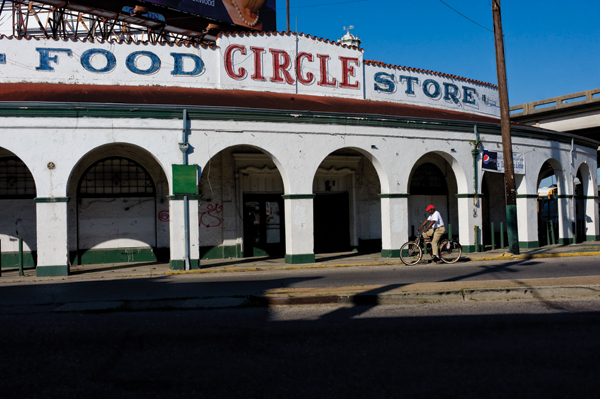
Prior to Hurricane Katrina, Circle Food Store provided residents of New Orleans' 7th Ward with fresh, low-priced produce for more than 60 years.
For more than 60 years, Circle Food Store was a bustling center of commercial life in New Orleans, serving as the ultimate one-stop shop for residents of the 7th Ward and surrounding neighborhoods. The first African-American-owned-and-operated grocery store in the city, Circle Food sold everything from fresh meat, seafood and vegetables to toasters, ironing boards and school uniforms, but owner Dwayne Boudreaux doesn’t miss a beat when asked what the store was best known for.
“Bell peppers, five for a dollar,” laughs Boudreaux. “If you’d ask anybody in the 7th Ward what do you know about Circle Food Store, it was that we had fresh, low-priced produce.”

In 2005, Hurricane Katrina filled the historic structure with five feet of water, leaving millions of dollars in damage in its wake.
Circle Food Store served the community until 2005, when Hurricane Katrina filled the historic structure with five feet of water, leaving millions of dollars in damage in its wake. Since 2007 Boudreaux has worked to reopen the store, but with inadequate insurance proceeds and little assistance from the city’s recovery office, Circle remains shuttered due to a lack of funding.
Now, thanks in part to the efforts of four Freeman School MBA students, Circle Food Store may finally be on the verge of a rebirth.
In April, J.J. Rassier (MBA ’11), Francisco Robert (MBA ’11), Chris Williams (MBA ’11) and Ruth Yomtoubian (MBA ’11) completed an exhaustive 30-page business plan for the store, providing Boudreaux with a crucial document for securing the financing necessary to reopen the store. The plan includes industry and market analyses and sections on the store’s business model, marketing strategy, management and operations. Perhaps most significantly, the plan includes a set of detailed financials outlining the store’s capital needs and projected cash flows. The students estimate the cost to reopen the 38,000 square foot store at $5.6 million.

Francisco Robert, Chris Williams, Ruth Yomtoubian and J.J. Rassier spent more than eight months working on a business plan to help reopen the historic Circle Food Store.
The MBAs first got involved with the project in the fall of 2009 through Tulane City Center, a program of the School of Architecture that links students and faculty members with applied urban research projects. Architecture students were working on a proposed historic rehabilitation of the store, and they reached out to the Freeman School for business students interested in writing a business plan to accompany the designs.
“We’d never even read a business plan before we started,” laughs Robert. “We went step by step, and every class gave us more tools. We were applying what we were learning as we went.”
With strategy and entrepreneurship professor Ralph Maurer as their adviser, the students met with Boudreaux, the architecture team and representatives from the 7th Ward Neighborhood Center, a community group working to reopen the store. They interviewed local residents to understand what Circle Food meant to the community, and they got feedback on their plan at Tulane Entrepreneurs Association workshops. They even cornered Whole Foods Market CEO John Mackey when he spoke at Tulane last fall and peppered him with questions about the industry.
“I think we did a good job pulling what Dwayne had to say and what the architecture students were doing and putting that into business language,” says Yomtoubian. “We’ve learned a lot about conscious capitalism at the business school, and we knew that was a model that fit Dwayne’s personality and style as a businessman perfectly.”
Conscious capitalism emphasizes the importance for businesses to have a purpose beyond profits, and with more than 50,000 people in the surrounding neighborhoods with no direct access to fresh groceries, the MBA students didn’t have to look far to find a purpose for Circle Food Store.
To integrate the store’s social purpose with its business model, the students came up with some innovative solutions. For example, Boudreaux had long rented out space in the store to specialty shops, but never in any systematic way. The students recommended restructuring the specialty retail section of the store and using the additional income generated to subsidize the cost of fresh produce for customers.
“We kind of made a mold this time and calculated rent per square foot based on what he should charge,” Williams says. “It’s definitely more structured than it was before because he wasn’t charging much rent.”

Owner Dwayne Boudreaux hopes to use the business plan written by the Freeman MBA students to secure funding to reopen the iconic 7th Ward grocery store.
In the end, Boudreaux was thrilled with the plan.
“I was able to present it to the City Council and show it to people with the city,” Boudreaux says. “They have something to look at to see what the vision is, what the plan is and what kind of operation I’ll be able to run. Tulane helped to put my vision on paper, and I could never put it on paper the way they did.”
Armed with the business plan, Boudreaux says he plans to meet with city officials again to discuss reopening the store, and if the city can’t provide him with the necessary funding, he’s ready to pursue private financing. Once he lines up financing, which he hopes to do this fall, Boudreaux says the new Circle Food Store could be open within nine months.
“I wish I would have met the Tulane staff and students earlier in this endeavor,” Boudreaux says with laugh. “I’d be open by now.”

